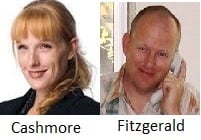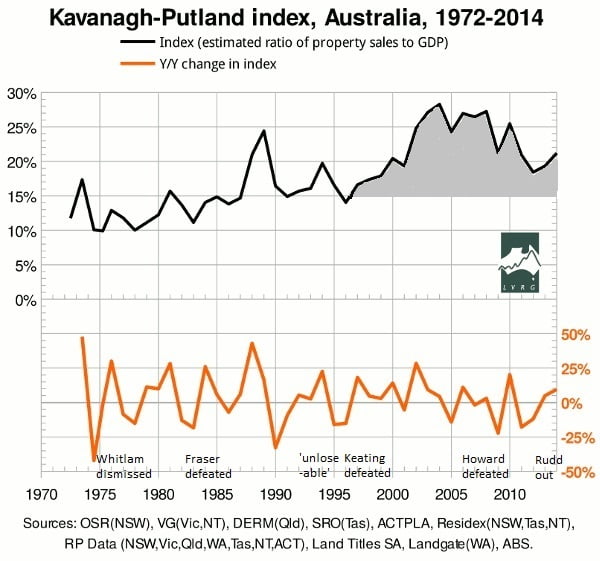
Cashmore-Fitzgerald vacancies report for Prosper Australia.

Cashmore-Fitzgerald vacancies report for Prosper Australia.
Thank heaven for the ACT housing market (not). Its highly inflated level, created when a couple of high-profile real estate agents discovered the gap between early 1990s ACT house prices and the earnings of Canberrans, is such a river of gold for so many.
And the deprivation of so many. The leasehold system, designed to enable good affordable housing, leaving a reasonable amount of disposable income for cultural and recreational pursuits, has been trashed. Now the ACT government can make excessive multiple profits on raw land sales. So can planners, engineers, surveyors, valuers, civil engineering contractors, spec builders, project builders, realtors, banks, etc.
They do so in an overbearing process that leaves new-home buyer/occupiers struggling with massive debts, stranded on micro plots of land in shape-and-design-predetermined unextendable dwellings, with no room for even a kids’ trampoline or a shed, while being told to enjoy the uselessly broad, genteel ”public realm” strip outside their tiny front yards – that realm and the associated excessive land-gobbling estate infrastructure being the conduits for those huge profits, all bludged off the inflated house-price market.
It’s time to reform this ”industry”, and empower owner-occupiers.
Jack Kershaw, Kambah
When I am in Canberra I always use my car, when I am in Sydney, I almost always use public transport or my bicycle. I don’t think there is much unique in my decisions: expediency, efficiency of getting from one place to another, and concern for my environment – particularly avoiding stuffed smoky roads in Sydney that frustrate, raise blood pressure, and smoke the lungs with exhaust fumes and particulates.
Unless the ACT government builds a rail system that can compete with Canberra’s ample, efficient roads and parking space then it is wasting its time and the economy’s resources. But maybe the determination for the environment might drive the ACT government in a different direction: developing a ”vibrant” Canberra in a way that makes it cluttered and frustrating for motorists (much like Sydney), defying the wishes of many of its residents, destroying its character and the light rail might be part of the ”solution”.
George Papadopoulos, Yass, NSW
(Comment: Of course, Walter Burleigh Griffin designed a rail system into Canberra. However, the bureaucrats knew better: no rail was necessary. The car had been invented and it was beginning to do very well!)

“Despite what they say close to elections, most state governments like the GST: the federal government wears the odium for imposing it while they get to spend the proceeds. An efficient, progressive state tax identified by Terry Moran and his colleagues in a recent Committee for Economic Development of Australia report is land tax. Its electoral appeal would be improved if its proceeds were hypothecated to, say, public transport, or to health and education. But it’s a safe bet that the CEDA authors have not been knocked over by the states in a clamour to levy extra land tax when a federal GST rate rise offers them all care and no responsibility.”
– Former Labor Party Minister, Craig Emerson, in the Australian Financial Review today.
Always of interest if you wanted to understand their opposition to extending and reforming State land tax (the proven fairest and most efficient tax base of all).
Listening to Prime Minister Tony Abbott, it is clear his “mature debate” on tax reform amounts to Australians accepting that the GST must be extended. Institutes, such as the Grattan, may whisper about the possibilities of a land tax, but they then shout about the need to remove the existing GST exemptions. (Of course, Grattan is funded by governments and banks!)
As mainstream media has acceded to the call to increase our revenue from the GST, the electorate seems to have taken up the idea by osmosis, because no serious discussion has taken place on the benefits of an all-in, single rate land tax. So, who really cares if increasing the GST will pillory people with no ability to save? Who cares that study after study has shown land to be one of the most efficient tax bases of all, can’t flee to tax havens, and that a tax on land cannot be passed on in prices? But it’s too hard for politicians – especially when they have proven to be very keen ‘property’ investors.
One key point never comes up: we’ve experienced world financial collapse because of burst real estate bubbles–except in Australia, Canada and China–but we’re nevertheless unprepared to undertake a fiscal measure that would keep a lid on the escalation of land prices. Why is the property market divorced from the study of economics?* Passing strange, or just plain stupid?
As if to underline the obtuseness of the mainstream commentariat, this morning on the ABC’s “Insiders”, the Sydney Institute’s Gerard Henderson opined that we should be concerned about Australia’s public debt level, which is amongst one of the lowest in the world. [!]
No, Gerard, it’s our private debt, represented predominantly by mortgages, about which we need to worry, those trillions we’ve shunted into the current unburst Australian property bubble since 1996 (as shaded grey in the chart below). Many thoughtful people have already discerned the potentially disastrous fallout should the Australian bubble burst, but these remain a minority. They will need to be a vocal minority if an increased GST is not to become a reality.
The practical need is not an extended GST. We need to take up Ken Henry’s recommendation for the abolition of 120 taxes, for the introduction of an all-in land tax and a federal mining tax. But there’s nobody in the commentariat with the wit nor fortitude to promote such deliberately well thought-out ideas. Why not? Too hard?
This is the moment for genuine revenue reform in Australia.

*“The theory of valuation is a pragmatical extension of economic theories relating to value and price, but it is remarkable to find that there is an almost complete dissociation between economic theory and the theory of valuation, although the latter from the materialistic viewpoint stands in the forefront of the social sciences”. – Dr JFN Murray, “Principles and Practice of Valuation”, Commonwealth Institute of Valuers, Sydney, 1969, Fourth Edition, pp. 79, 80
We need (another) mature tax debate.
But this time you’d better pay attention and not run scared, Lib/Labs!
Australia’s foremost indicator of total property market and upcoming recession.
Residential, commercial/industrial and rural sales divided by GDP.
And Dr Terry Dwyer’s comment on the Accountants Daily Newsletter piece is an importantly apposite contribution!
